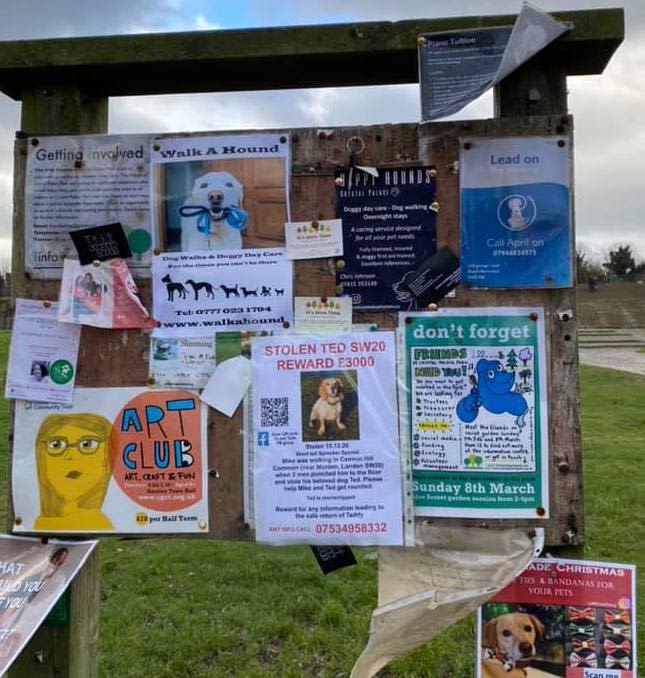Could changing the law end Britain's dog theft epidemic?
As dog thefts soar over lockdown, meet the people fighting to bring Britain's stolen pets home.

Louise* was on holiday when she got the call.
Sally, her beloved spaniel, had vanished.
She’d been snatched at a game fair in the Midlands in the space of 20 seconds, leaving just her lead behind.
Louise was devastated.
“I think I cried for 10 hours straight,” she said.
She went to the police and they did what they could, but they didn't have the time or money to do a proper investigation.
"That’s the brutal reality.”
Louise realised that if she wanted Sally back, she’d have to take matters into her own hands.
She bought 1,000 advertising spaces across the UK, handed out leaflets on street corners, and got help from DogLost, a charity set up to help bring missing dogs home.
For six months, she worked flat out until, thanks to a tip-off, the two were reunited.
Louise found Sally covered in cleaning fluid, left fat and unfit by being kept in a kennel.
She is now back to normal, but many others aren't so lucky.
Like Ted, a spaniel who was stolen from his owner Mike on a morning dog walk last month.
"My dad was beaten up so they could steal his dog"
— This Morning (@thismorning) January 15, 2021
Mike Jasper was walking his dog Ted when his dog was stolen. Mike’s daughter Lucinda joins us as the family continues to search for Ted.
Watch the full conversation here 👉https://t.co/88OxHurggP pic.twitter.com/5RauatSSOA
His story made national papers and two weeks after he was snatched, his collar was found and returned.
But he is still missing - and Mike, his owner and best friend, is still devastated.
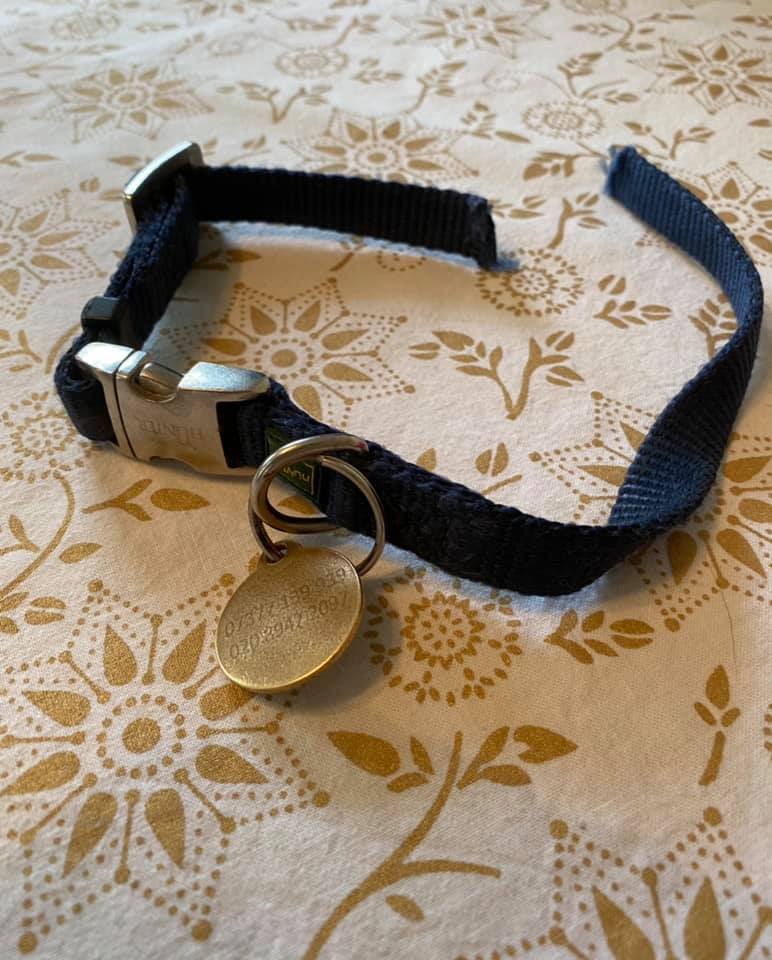
The Problem

Dog theft is a crime that is striking in its cruelty, and it is a growing problem.
In the UK, five dogs are reported stolen every day.
Since 2015, reports of dog theft have increased almost every year.
The pandemic has only made things worse.
Responses by over half of UK police forces to Freedom of Information requests show that in the months after the March lockdown, dog thefts were up by 66% compared to the year before.
Demand for dogs has soared in the past year, as people want lockdown companions.
The pressure on supply chains brought about by closed borders has pushed prices up and puppies now go for at least £2,000 online.
For criminals, stealing dogs is more lucrative than ever.
While some are sold on to loving families, many - especially those that like Ted aren't neutered - go to cramped, dangerous puppy farms where they are bred from for years.
As DogLost Police Liaison Karen Harding explains, dogs who go to puppy farms are difficult to recover.
She said: "We've had some reunited after five years, seven years, months later after they've been stolen.
"They've been bred from, and then if they're not getting pregnant again or performing, they're being let go - just left somewhere.”"

Karen with Robin and Rosco at DogFest North
Karen with Robin and Rosco at DogFest North
But even as dog theft reaches record levels, it seems that little is being done.
While police are often sympathetic to dog theft, the stories of Louise and other victims show that they lack the resources to take the crime seriously.
Less than 5 percent of dog thefts result in a criminal charge.
And statistics from DogLost show that even with the charity's help only a tiny fraction of stolen dogs each year are reunited with their owners.
So what can be done?
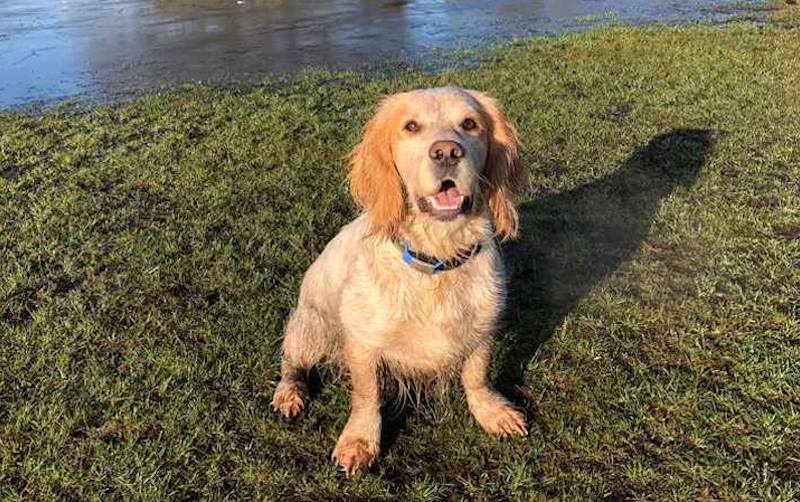
The Solution?

For activists and supporters of the campaign for Pet Theft Reform, the solution is simple - change the law.
Since 2016, campaigners have been lobbying to amend the UK’s theft, animal welfare and microchipping laws.
Their key goals are to make pet theft a crime in its own right, give tougher punishments to criminals who are charged with it, and make it compulsory for vets to scan animals at first presentation.
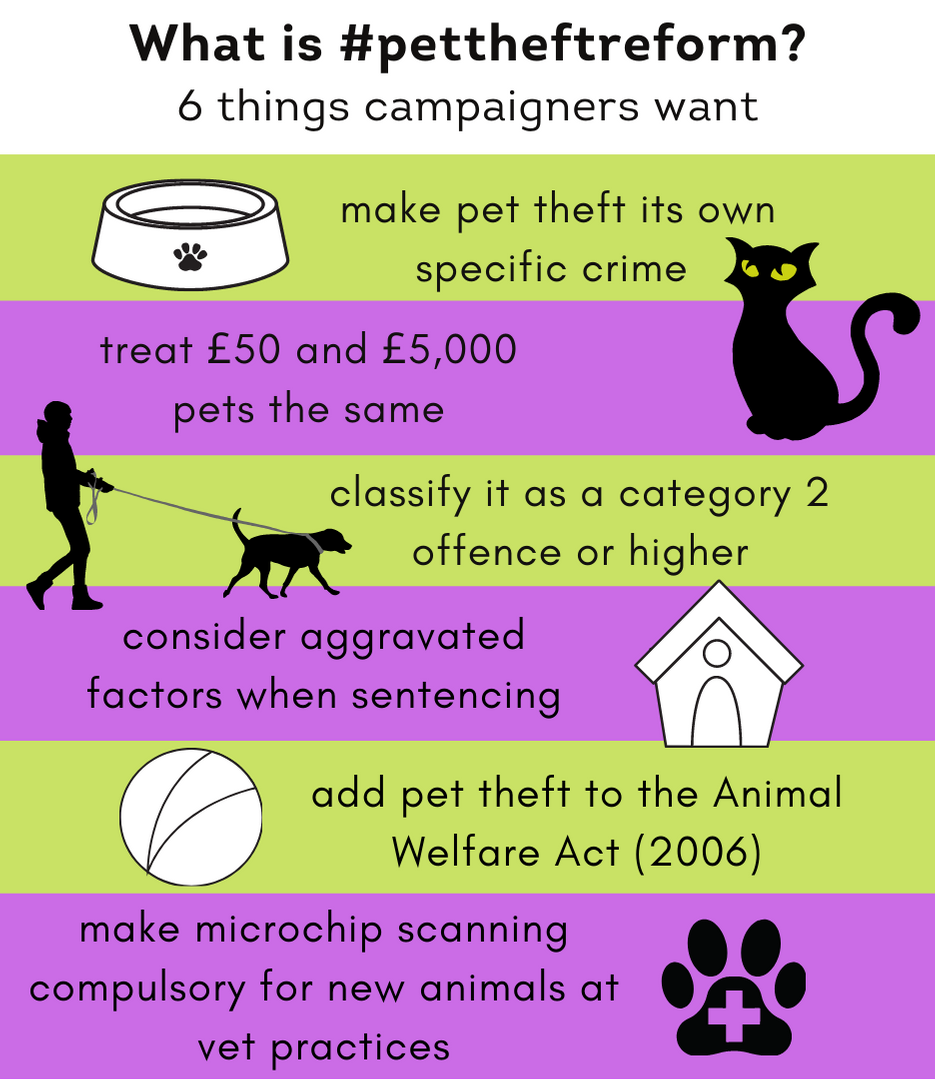
Source: http://www.pettheft.org.uk/ Graphic by Ellie Brown
Source: http://www.pettheft.org.uk/ Graphic by Ellie Brown
Below, three people supporting the campaign explain how these changes would help solve the problem.
First, for retired detective Mark Randell, recording dog theft separately to other thefts would help police understand the scale of what is happening.
And with better data, he explained, they could start analysing dog theft and tackling it systematically, for example finding the crime hotspots.
"Then you can really start to do some preventative policing," he said.
He added that rather than being extra work, tackling pet theft would help police achieve their wider goal of safer societies.
"If you tackle pet theft, you will solve other crime - you can guarantee that because that’s always been the case," he said.

Mark with Dotty
Mark with Dotty
Second, changing the classification of dog theft and strengthening guidelines from the sentencing council would help make sentences for dog thieves tougher.
Dr Daniel Allen, an animal geographer at the University of Keele and a leading voice in the campaign, explains the benefits this could have.
"The problem with dog theft is that it is a low-risk, high-reward crime,” he said.
He rejected the government's position that existing theft laws account for 'emotional distress' caused by the stolen object and can give thieves up to seven years for the crime.
In practice, he said, the evidence shows dog thieves only get small fines and suspended sentences.

Daniel with Rupert
Daniel with Rupert
This stands in stark contrast to the hundreds of thousands of pounds that puppy farms can make those who run them.
Third, the campaign's final goal is to make it a legal requirement for vets to scan the microchip of pets at first presentation to their practice.
This aspect of the campaign, known as Fern's Law, has been lobbied for by Debbie Matthews for 14 years.
Matthews had her own dogs stolen in 2006 and sold on to members of the public.
She assumed they would be scanned by vets and returned to her, and was shocked when she found out this wasn't mandatory.
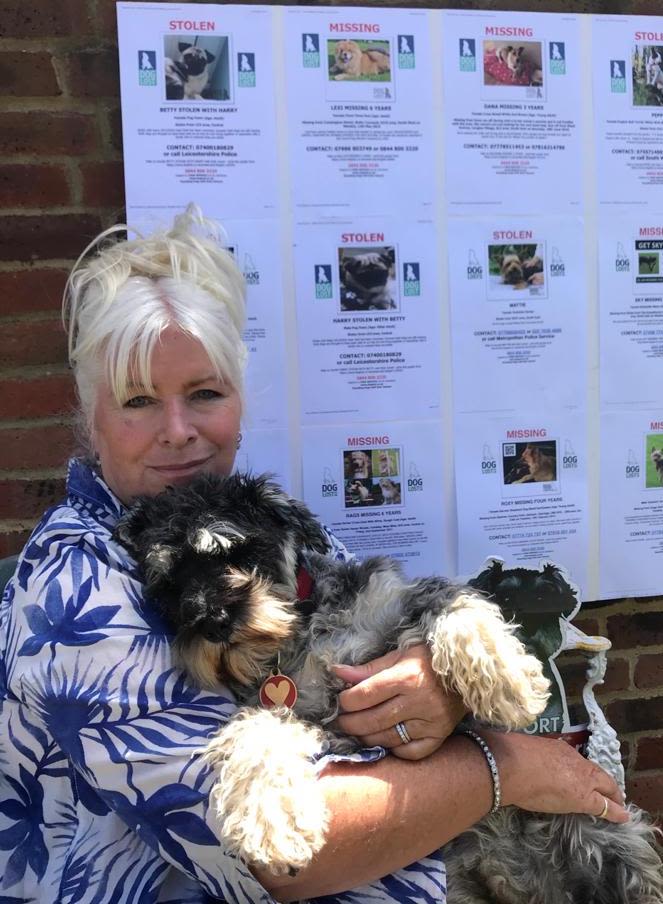
Debbie with Pepper
Debbie with Pepper
She said: "Because the BVA (British Vet Association) have made it best practice, and a recommendation, and then a strengthened recommendation, you assume it's happening.
"It's just a big con."
She recalled cases where stolen dogs had not had their microchips scanned and been spotted by vets, like Fern, the dog who has given the law its name.
"That's why we need the government to make it a legal obligation - that's the bottom line," she said.
So far the campaign has met with mixed success.
Three petitions to make pet theft a separate offence all received over 100,00 signatures, and in 2018 backbencher Ross Thomson proposed the Pet Theft Bill, which would have enshrined this in UK law.
But the Bill failed to pass before the 2019 election, and last week, the government dismissed the campaign's most recent petition - despite it gaining broad support from MPs in an October debate.
Fern's Law has fared better, and is now part of a government consultation on microchipping pets which is open to the public until February 17.
But it continues to be opposed by the British Vet Association (BVA), which recommends regular scanning but say that making it compulsory could put the safety of customers at risk.
BVA Senior Vice-President, Daniella Vos Santos, said: “Making vets enforcement officers of any kind risks compromising trust between vets and owners and could deter some people from accessing vital care and treatment for their pets."
What is clear is that campaigners aren't going to give up anytime soon.
"It's gaining political support, it's gaining public support, and the key thing is we need it to keep the public safe" said Dr Allen.

Mike with Ted
Mike with Ted
But for victims like Mike, until their dog is found, any change will be too little too late.
*Name changed to protect victim's identity
